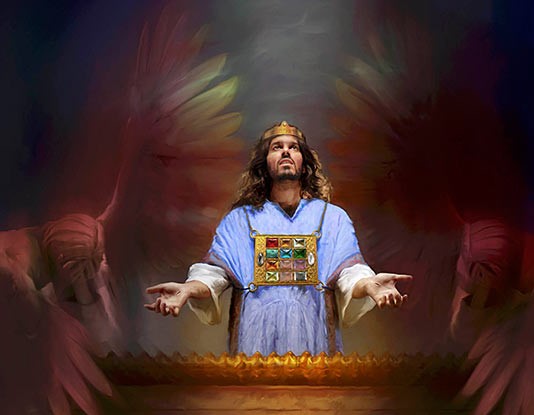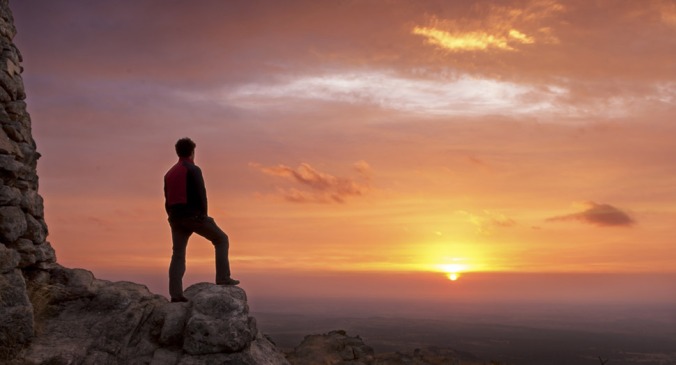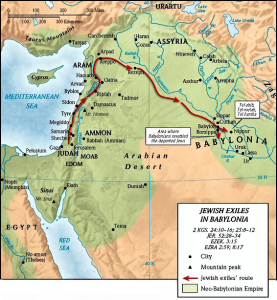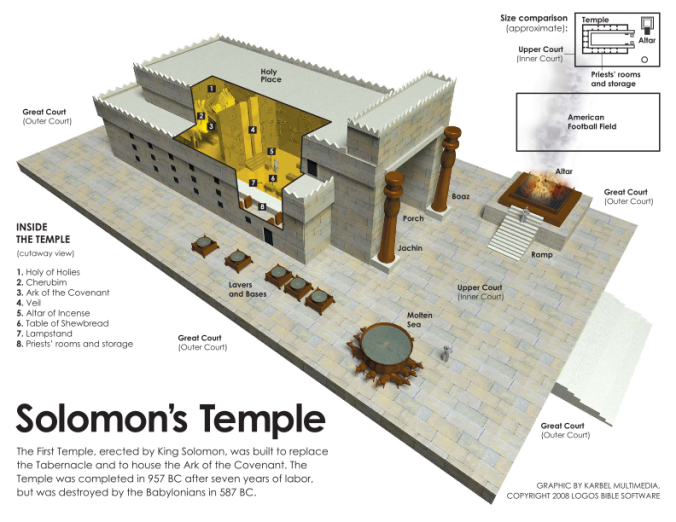
Psalm 110 is quoted more in the New Testament than any other Old Testament passage. It is a royal hymn centered around the words of Yahweh. In it we discover prophecy and a divine oath. While this psalm may have been sung at a king’s inauguration or possibly before a king went to war, we will be focusing on its future proclamation.
The psalmist begins with a declaration (נאס) from the Lord. Right off the bat we learn this song was a prophecy, an oracle, of someone to come. Yahweh making his declaration to my Lord (ארנ – Adonai). One who has been Divinely appointed to sit at the right hand of the Father – an exalted position – until He defeats the enemies of Adonai. Who is this divinely appointed Lord?
In Matthew 22, Jesus questioned the Pharisees – “What do you think about the Messiah? Whose Son is He?” (v.42 – HCSB) They answered, “David’s”. Jesus now quotes Psalm 110:1 as a reference to Himself.
Matthew 22:43-45, He asked them, “How is it then that David, inspired by the Spirit, calls Him ‘Lord’: The Lord declared to my Lord, ‘Sit at My right hand until I put Your enemies under Your feet;? “If David calls Him ‘Lord,’ how then can the Messiah be his Son?” (HCSB)
Jesus is Yahweh’s representative to extend (ישלח), that is stretch out, His territory beyond the city limits of Zion (Israel). Adonai has a volunteer army who believe in the cause. They are an army born with a sacred purpose (vv. 2-3). Womb of the dawn may refer to the dawn of the new kings rule, which will birth a holy army and expand God’s territory (Broyles).
But then, in verse 4, the Lord says His king representative is a priest as well, like Melchizedek. A priest had authority to minister before the sacred places of Yahweh. Who is this Priestly King? The writer of Hebrews tells us.
Hebrews 5:5-6, In the same way, the Messiah did not exalt Himself to become high priest, but the One who said to Him,… You are a priest forever in the order of Melchizedek. (HCSB)
Unlike the priests in the line of Aaron, Jesus didn’t appoint Himself. He was crowned with glory because of His suffering of death (Heb. 2:7, 9). Unlike the Aaronic priests, the Messiah would be an eternal priest. Yet, the real clue is Melchizedek, who was both a priest and king of Salem (later known as Jerusalem). The Melchizedek Scroll, which is an extrabiblical text found among the Dead Sea Scrolls, depicts Melchizedek as a heavenly figure who is more exalted than angels. The point the psalmist is making, as well as the Hebrew writer, is the Messiah’s priesthood was superior to the priesthood of Israel. The name Melchizedek (Heb. malki-tsedeq :טלי-ערק), is significant. The Hebrew tsedeq means “righteousness” and the city Salem can be translated “peace”. The writers see the Messiah as the king of righteousness – the king of peace.
Isaiah 9:6-7, For a child will be born for us… He will be named… Prince of Peace… He will reign on the throne of David and over his kingdom, to establish and sustain it with justice and righteousness from now on and forever… (HCSB)
So what does this mean to us? Actually everything! Hebrews 7 sums it up the best. Melchizedek resembles the Messiah because of his unique priesthood and how he obtained it. Abraham blessed Melchizedek (Gen. 14), not the other way around, which shows that his priesthood (along with the Messiah), was superior to the priesthood of Abraham and his descendants. The Levites, who made up the priesthood, were mortal and eventually died, but Christ holds the office permanently. The Levitical system wasn’t able to bring perfection, but Jesus (like Melchizedek), came from a different kind of priesthood. Since the law was maintained by the Levitical priesthood, there must be a change now that a superior priest has arrived. The former was only to bring about an outward cleansing, but the new did more than purify people, it removed sins. The sacrifice of Jesus is greater, because He is holy and sinless, unlike the Levitical priests. He doesn’t have to offer sacrifices everyday as they did, because He offered Himself! Go back and read Hebrews 7. The very next chapter sums it up:
Hebrews 8:1-2, Now the main point of what is being said is this: we have this kind of high priest, who sat down at the right hand of the throne of the Majesty in the heavens, a minister of the sanctuary and the true tabernacle, which the Lord set up, and not man. (HCSB)
Our Priestly King! The psalmist, as well as those early readers, would have to wait to see the reality of this prophetic song. Today we bow down before our Priestly King, thanking Him for His goodness, mercy and grace.

 I hear others talk about their anxieties. “What if _________ is elected?”; “What if the health care system fails?”; “What if we enter World War III?”; “What if the president builds a wall?”; “What if the president doesn’t build a wall?”; “How am I going to handle this death?”; “What if my cancer isn’t treatable?”; “What if my spouse leaves me?”; etc., etc., etc. My purpose is not to belittle our concerns, but to help us find peace.
I hear others talk about their anxieties. “What if _________ is elected?”; “What if the health care system fails?”; “What if we enter World War III?”; “What if the president builds a wall?”; “What if the president doesn’t build a wall?”; “How am I going to handle this death?”; “What if my cancer isn’t treatable?”; “What if my spouse leaves me?”; etc., etc., etc. My purpose is not to belittle our concerns, but to help us find peace. Let’s go back to my opening thought of being a small child without the worries of the world. That was a peaceful time. The psalmist pictures Yahweh as a mother with her little weaned child. Maybe a toddler or slightly older but still small enough that standing beside its mother is calming. A happy trust. This child doesn’t understand the major issues in life, but they trust she has it covered and will ultimately make everything alright.
Let’s go back to my opening thought of being a small child without the worries of the world. That was a peaceful time. The psalmist pictures Yahweh as a mother with her little weaned child. Maybe a toddler or slightly older but still small enough that standing beside its mother is calming. A happy trust. This child doesn’t understand the major issues in life, but they trust she has it covered and will ultimately make everything alright.




 by King Nebuchadnezzar II. They brought it upon themselves with their rebellion against Yahweh and serving idols. They had been warned for a while so God finally cursed them with exile. The Book of Lamentations will give you a better idea of how bad things would be for the people. Yet, instead of destroying this people, the Almighty God limited the curse to 70 years. True to prophecy, in 537 B.C. they were freed by King Cyrus of Persia to return to Israel and begin rebuilding the city and the temple. It is a powerful account in Scripture and the history of Israel.
by King Nebuchadnezzar II. They brought it upon themselves with their rebellion against Yahweh and serving idols. They had been warned for a while so God finally cursed them with exile. The Book of Lamentations will give you a better idea of how bad things would be for the people. Yet, instead of destroying this people, the Almighty God limited the curse to 70 years. True to prophecy, in 537 B.C. they were freed by King Cyrus of Persia to return to Israel and begin rebuilding the city and the temple. It is a powerful account in Scripture and the history of Israel.




